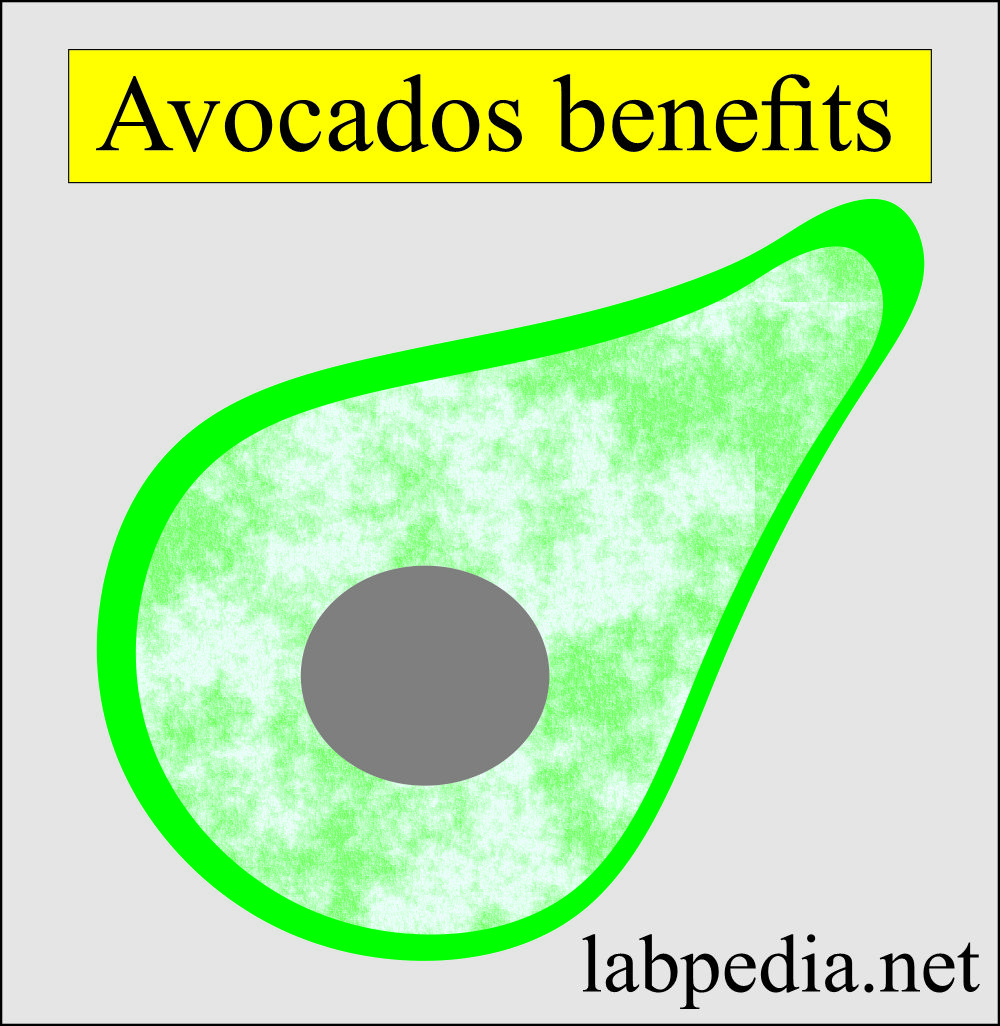Avocados benefits
What are the Avocados benefits?
- Avocados carry more calories compared to any fruit. One average size Avocado has 731 calories.
- In other reference one average size avocado has 200 to 400 calories.
- One average size avocado contains:
- 240 calories.
- 13 grams carbohydrates.
- 3 grams protein.
- 20 grams of fats.
- 15 grams of monounsaturated fats.
- 3 grams saturated fats.
- 4 grams polyunsaturated fats.
- No cholesterol.
- 10 grams fibers.
- 11 mg sodium.
- Avocados have measurable fat contents, with up to 30 grams each; it is half the daily recommended dose for an average adult.
- A dietician will recommend adding one avocado every day to improve your health benefits.
What are the Avocado contents?
- Folate.
- Potassium.
- A high amount of fibers.
- High contents of monounsaturated fats.
- Antioxidants.
- Number of nutrients.
- The above 3 and 4 are good for diabetics and heart disease patients.
What are the benefits of Avocados for Diabetic patients?
- Diabetic patients are recommended to eat more fiber in their diet.
- The fat in the avocado will lead to a decline in harmful fats.
- Avocados are a rich source of monounsaturated fats (oleic acid). These monounsaturated fats improve the fat level in the body and help to control diabetes.
- Patients with diabetes were put on a high-fat diet where avocados provided 40% of calories. It was found that there was a 20% drop in triglycerides.
- For diabetic patients eating Avocados, the oleic acid in the avocados helps to lower cholesterol.
What are the Benefits of avocados?
- Avocados are rich in healthy fats.
- It lowers the cholesterol level.
- It lowers the low-density protein (LDL). We know that LDL protein will lead to atherosclerosis.
- It increases the high-density protein (HDL), which is protective against heart disease and prevents atherosclerosis.
- It will lower triglycerides.
- It is a good source of dietary fiber. These fibers will add to the bulk of the stool.
- Avocados are full of nutrients like potassium, vitamin K, vitamin E, and vitamin B. It also provides small amounts of magnesium, manganese, copper, iron, zinc, and phosphorus.
- It gives potassium to the diet. 1/2 of an avocado provides 548 mg of potassium (16% of the daily allowance).
- Eating avocados prevents heart attack and stroke and lowers the risk of high blood pressure.
- It is a rich source of folates.
- Folate adequate amounts in diet will prevent birth defects of the brain and spine.
- 1/2 of the avocado contains 57 micrograms of folate (14% of the daily requirement).
- Folate is an essential nutrient for keeping nerves functioning correctly.
- Antioxidants like carotenoids help to prevent eye problems.
- Bone health improves due to the presence of vitamin K, which helps to improve the absorption of calcium and bone mineralization.
- An adequate level of vitamin K lowers the chances of fracture.
- Skin is moisturized due to the presence of monosaturated fats.
- Vitamin C and vitamin E have antioxidant properties that may protect the skin from damage.
| Fruit | Glycemic load | Glycemic index | Carbohydrates | Fats | Calories |
| Avocado | Zero | 1 | 1.9 grams | 19.3 grams | 190 |

